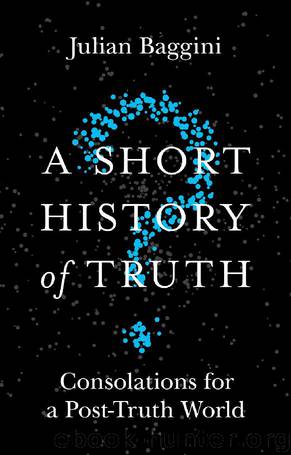A Short History of Truth by Julian Baggini

Author:Julian Baggini [Baggini, Julian]
Language: eng
Format: epub
Publisher: Quercus Publishing
Published: 2017-09-21T00:00:00+00:00
6. Creative truths
In 2005, President George W. Bush stood on the deck of USS Abraham Lincoln and declared ‘mission accomplished’ in Iraq. Well, not quite. Bush never uttered those words, which were actually displayed on a huge banner draped across the ship. He did, however, say that ‘Iraq is free’, that ‘We’ve begun the search for hidden chemical and biological weapons’, and that ‘We will stand with the new leaders of Iraq as they establish a government of, by, and for the Iraqi people’. Many now see these as lies, or at least falsehoods. So with the benefit of hindsight, were Bush’s words true or false?
The question risks misunderstanding the nature of such declarations. Bush was never simply describing the facts: he was declaring both his hopes and intentions. As his promise of support indicated, no one was so naïve as to believe the job was literally over, so that everyone could go home and leave behind a liberated nation. Iraq’s freedom depended on continued assistance. His words only make sense if they are taken to be as much about what was to happen as what had already happened.
It was not the first time that a statement of intent by Bush was mistaken for a description of facts. When he told the world, before a joint session of Congress eleven days after 9/11, ‘Either you are with us, or you are with the terrorists’, he was not stating a fact but issuing an ultimatum. This was made clear by the sentence that preceded it, usually omitted when it is quoted: ‘Every nation, in every region, now has a decision to make.’ Bush wasn’t stating a fact, he was creating one. By saying that nations were either with him or against him, he was making it true.
The idea that you can make something true just by saying it strikes many as just the kind of nonsense the post-truth world has led us to. In fact, it is not at all mysterious how saying can make it so. When a legally sanctioned celebrant says, ‘I now declare you husband and wife’, a legal union is sealed. And when a Muslim man says to his wife ‘talāq’ three times, then in some jurisdictions at least, he divorces her. These are examples of what the philosopher J. L. Austin called illocutionary speech acts, when ‘by saying something, we do something’.27 It is because some speech acts are illocutionary that it is not an infringement of free speech to prohibit incitement: calling on people to inflict harm on others is part of what causes that harm.
Just as words can change truths, new truths can change words. Where same-sex couples can be wed, the meaning of ‘marriage’ has been changed, creating new truths about what is required to be married. Truths are being created all the time, changing reality for better or for worse. Truths about economic inequality are not brute facts of nature, they are created by political decisions. ‘Facts on the ground’ are changed by construction, bombing, public policy.
Download
This site does not store any files on its server. We only index and link to content provided by other sites. Please contact the content providers to delete copyright contents if any and email us, we'll remove relevant links or contents immediately.
The remains of the day by Kazuo Ishiguro(7551)
Tools of Titans by Timothy Ferriss(6948)
The Black Swan by Nassim Nicholas Taleb(6192)
Inner Engineering: A Yogi's Guide to Joy by Sadhguru(5897)
Giovanni's Room by James Baldwin(5878)
The Way of Zen by Alan W. Watts(5800)
The Six Wives Of Henry VIII (WOMEN IN HISTORY) by Fraser Antonia(4791)
The Power of Now: A Guide to Spiritual Enlightenment by Eckhart Tolle(4755)
Astrophysics for People in a Hurry by Neil DeGrasse Tyson(4620)
Asking the Right Questions: A Guide to Critical Thinking by M. Neil Browne & Stuart M. Keeley(4576)
12 Rules for Life by Jordan B. Peterson(3734)
The Ethical Slut by Janet W. Hardy(3503)
Skin in the Game by Nassim Nicholas Taleb(3461)
Housekeeping by Marilynne Robinson(3401)
The Art of Happiness by The Dalai Lama(3384)
Double Down (Diary of a Wimpy Kid Book 11) by Jeff Kinney(3273)
Skin in the Game: Hidden Asymmetries in Daily Life by Nassim Nicholas Taleb(3264)
Walking by Henry David Thoreau(3234)
12 Rules for Life: An Antidote to Chaos by Jordan B. Peterson(3203)
